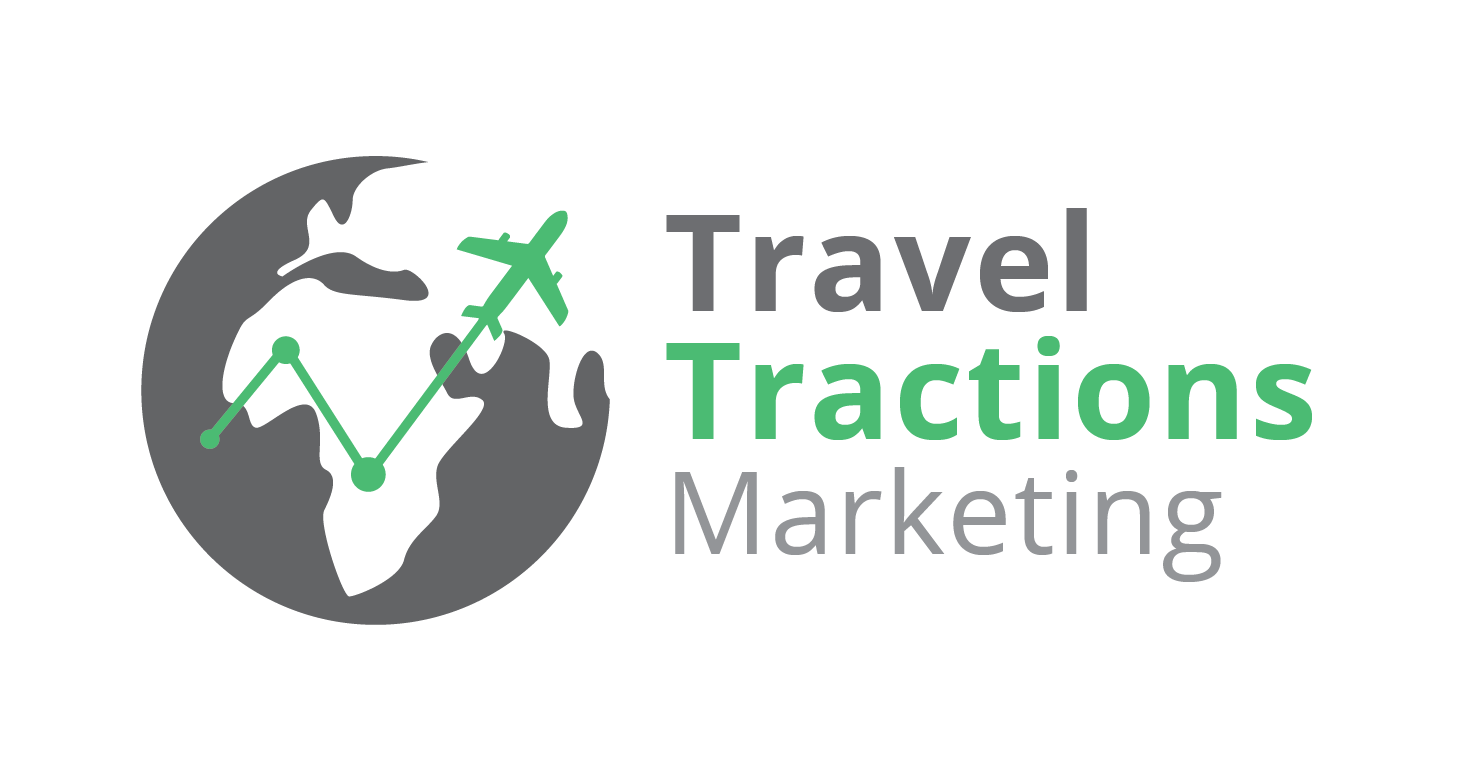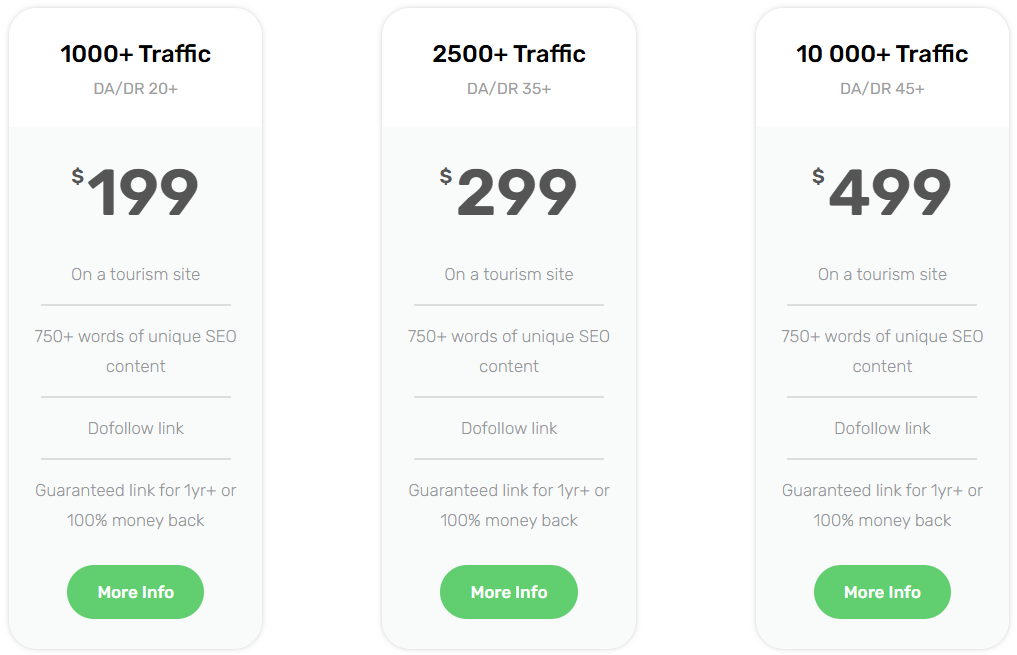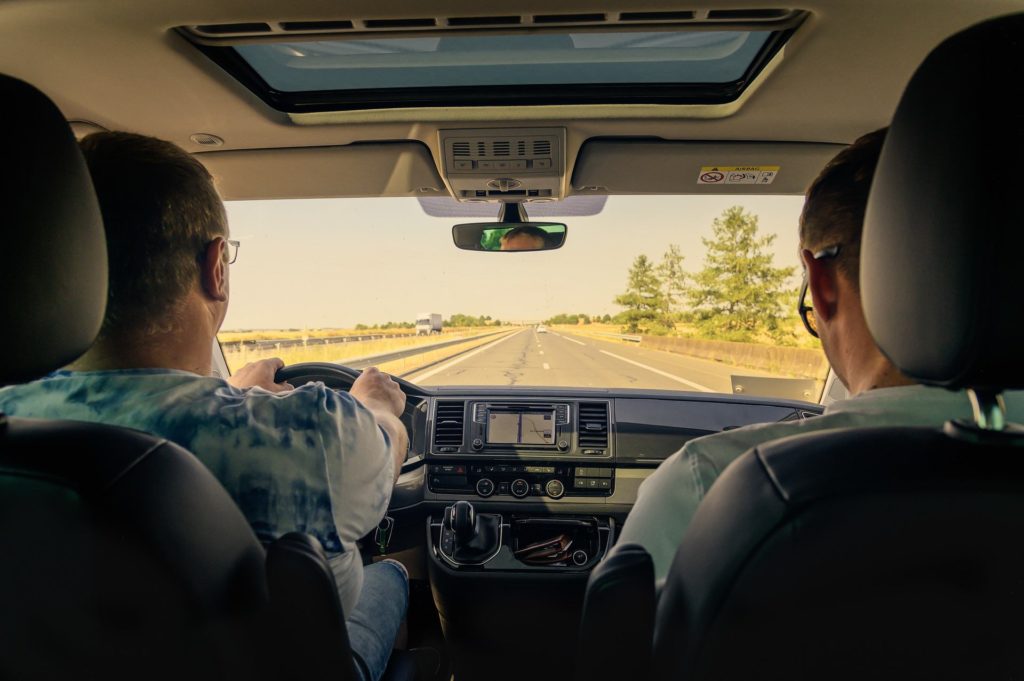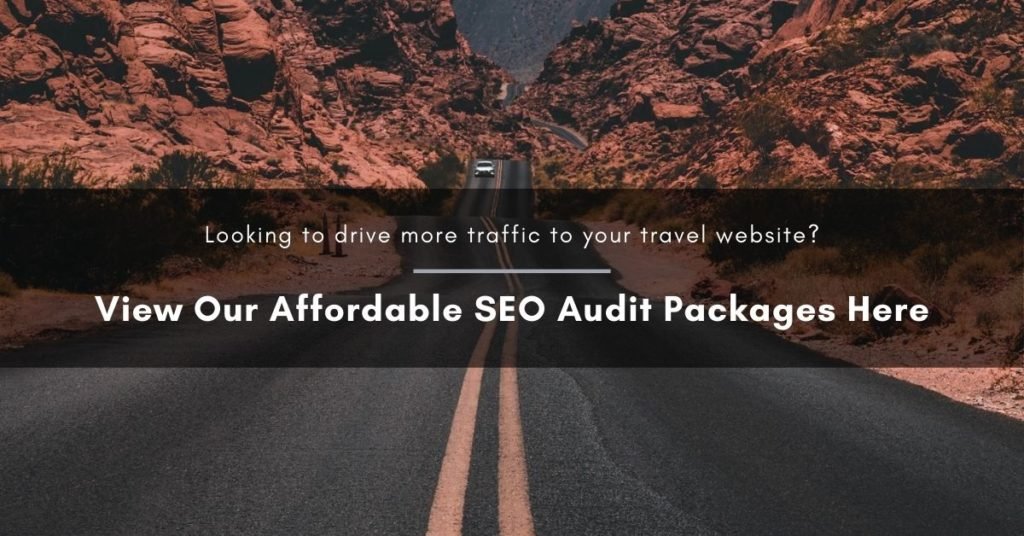
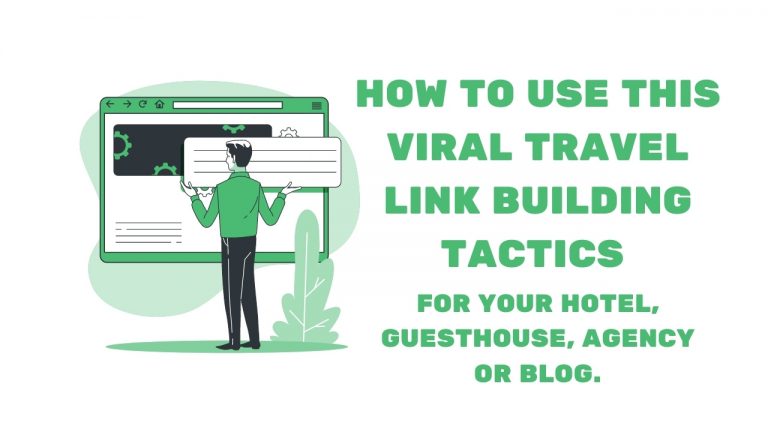
The Best Link Building Tactics for the Tourism Industry
Some travel companies have a lot of trouble building quality links to their websites. Lots of websites resort to web2.0’s, comments, travel site links services, forums, blog networks or just plain paying for links.
While these are ways to get links – they’re not ways to get good links, and they’re the exact same tactics everyone else is using. We’re going after much higher quality ones. We want links with high authority, links that are natural, and links that have lasting power.
Since 2009 I’ve worked on many travel websites – some very successful, and others not so much – so I’ve tested tons of methods. Some worked, and some didn’t.
I’m going to tell you the best ways I found you can get some really high-quality travel blog links to your travel websites. These are a select few of the techniques we use in our own Tourism and Travel Link Building Campaign packages – so you can be sure that they work.
Why Would Travel Industry Websites Link to You?
To understand how to create a strong link building campaign, you first need to ask yourself the following questions:
- What group of people will find the information on my site useful, valuable or practical?
- What websites do these groups hang out on?
- Does the website compete with you?
Sounds simple, doesn’t it?
Sure, it sounds simple, but most people don’t manage to get it quite right.
Most people focus on relevancy in terms of content, what you need to look for is relevance in terms of context.
You need to find websites that speak about complementary topics, not similar ones.
You need to find websites that are not trying to solve the same problem your post is, but ones that can complement your problem. If you reach out to a post that talks about the same thing, they’re simply not going to link to you – your site is their competition.
And of course, who helps the competition?
This is the typical way that bloggers and people new to SEO build links – you’ve probably seen links like this before. There are, however, far better methods that can take your link building campaigns and website traffic stats to the next level.
Plus, these links should bring in REAL TRAFFIC and LEADS, which is way more important than just building links to increase your rankings. A good link building campaign should not only show results in one area but should boost all of your website’s stats across the board.

The Best Travel Website Link Building Techniques
Here’s a short list of some of the basic travel link building techniques we use. These are all ways to build great travel blog links without too many blogging tools or resources: all you need is a bit of time, effort, and some strong content ideas.
The best tourism websites thrive on strong content in a well-planned niche, so be sure to use this to your advantage. Many of these are single-case examples but could be re-imagined in an endless number of ways to suit your own niche and situation.
Using Local Events
Keep in mind the main questions about link building:
- What group of people will find this useful?
- What websites do they hang out on?
Now, let’s apply these to local events, whether it’s a summit, festival, business event, conference, workshop, or anything else really. It doesn’t matter if you’re a global tour operator or a local independent hotel owner – you can use this technique no matter your occupation or position, and gain some authoritative links without any real effort.
Pick a local spot and find all local events. Depending on where you live, ‘local’ can be ambiguous, although you should have a good idea of what you would consider a local event.
People travel to go to these events. So there is an opportunity there: your site is useful to these people. If not, then you’re sitting on a goldmine of opportunity to turn it into a useful resource for attendees.
Look for these events in Google – you’ll find they usually have information on accommodation and transport on their site. Events like this often list hotels or accommodation nearby. They list B&Bs, hostels, car rental services, holiday homes, restaurants, etc.
In fact, these listings often extend past travel, into hospitality and perhaps even leisure niches – anything that event attendees might need to enjoy their time in your area, making the best of their free time using a list of resources supplied by the event website.
If you’re running a bigger site with thousands of accommodations, you could even create a dedicated page with the best accommodations near “Event X” and add in some information on price, accessibility, and public transport options. Then contact those events and ask to be mentioned on their site in return.
In creating complementary content that helps out certain aspects of the event, without actually taking away or competing for any of their business. You’re solving potential problems for attendees, and this is only going to help the event run smoothly.
By using methods like this, you give them no option but to link to your website 🙂
Kinds of events which list accommodation and travel sites:
- Summits – think Convention Centers, etc.
- Festivals – this could be anything from a concert to an Oyster festival.
- Conferences – Search “conferences near me” on Google, and take a look at the upcoming events for each venue.
- Races – If you live near a racecourse, or somewhere that’s home to a lot of marathons then this can be a goldmine.
Niched Down Content
A very clever person once told me to niche down. I now tell people to niche down. It was some of the best SEO advice I ever received, and while it took me a while to understand why it was such a good idea, it’s only helped my business and business/content strategy. Let’s find out why.
When it was explained to me, he described niche-ing down in the following way:
“Let’s say you want to get a nose job. You don’t know who to use or where the best doctor is.
You turn to the internet or yellow pages. You find one general plastic surgeon and one rhinoplasty (fancy word for nose job) surgeon. The general plastic surgeon costs $400, the Rhinoplasty surgeon costs $800.
Which one do you choose?
The Rhinoplasty surgeon of course! (Even though it costs twice as much)”
Ok, so that’s a great anecdote story – but how do I apply this to link building?
Well, in link building this principle gets even better!
What if you wrote a piece of content on your site that would only benefit a really small percentage of your user base.
Again, think: “What group of people will find this useful?”.
These groups of people might be small, but the number of sites they hang out on might be big. The niche community may be larger than it appears, and the competition might not have targeted these groups yet, because they’re so small. This means your content will be the only content in that small niche. Niched content should always be something you’re constantly considering/analyzing for opportunity when building a travel website.
Maybe this is getting vague. Let’s use some examples.
Example 1: Holiday homes/hotels for People with Physical Disabilities
There is a small group of people who have a physical disability, but if you’re a hotel that provides an accessible room, make sure to promote that fact to the sites they go to.
The number of sites for people with physical disabilities is very large, and by tapping into this niche on the internet, you can easily position yourself as one of the main providers of this service. This is far easier to do in a small niche like this, compared to something like ‘luxury accommodation’.
Think of support groups, hospitals, organizations, and non-profits, etc. There are a lot of sites out there to help them, and they want to provide the best help possible. If you provide accessible services and rooms, you’re helping provide the best help possible.
Example 2: Birding holidays
Birding, or any other hobby, is a great opportunity for sites in the travel niche. There are literally hundreds of birding groups, forums, clubs, and fan sites. These people go on holiday too, and if you can provide a list of hotels/holiday homes that provide birding holidays, near a forest, or with the facilities needed, they are happy to link to you.
All of the best tourism websites (as in the ones that are most successful, and that we all know) have a niche that’s working for them. Even if the main focus of the site is not a specific niche, for example, “outdoor adventure tourism” – they will still use smaller focused niches in link building and outreach campaigns, as there is a much higher return on investment.
Both of these examples are quite different, but have the same thing in common:
These groups of people are a small subset of people you provide a service for. But, there is a large group of sites they hang out on or an easily accessible community through which to access these groups of people.
Create some type of content for these small groups and get links from all those sites. You’ll end up with:
You’ll end up with:
- High-quality links.
- A lot of opportunities your competition doesn’t have.
- People returning to your website or service, and recommending it within online communities.
- A chance to establish your name with a lasting reputation.
Although it’s a small market segment, and they don’t bring in a lot of conversions, they do bring in a lot of links, and those links help rank your entire site. SEO is all about focusing on many smaller moving parts, in order to see results in the overall performance of your website.
Local Authorities
Local authorities often have tourism promotion programs running.
So, again: What group of people will find this useful? What websites do they hang out on?
Well, the group of people is tourists, and they hang out on the sites of local authorities and governments promoting tourism in that area. These are great opportunities because they are such authorities and have a lot of link power. In addition, many local authorities or government tourism programs are highly encouraged to promote local business.
Check out the sites of local governments and see if they promote tourism in the area – most of them do. They’ll list lodging options, tours, car rental, events, and activities. If you provide such a service, find a way to be listed on their site. This can be achieved either through a polite email, phone call, or even a visit to your local tourism department (try and get specific, such as a parks department, or a website covering a specific conservation area).
Again, these are government sites, so getting listed is probably free, and a link from these sites can help your rankings a lot! They are extremely high-quality links. In addition, once you’ve been listed on one of these sites you have a boosted local credibility. This means that in turn, it will become easier for you to be listed on any partner or sister sites, once they see that you have been listed on another.
Visual Content Aimed at Travel and Tourism Websites
Let’s keep our two important questions in mind when exploring this next section:
- What group of people will find this useful?
- What websites do they hang out on?
You’ve likely seen some infographics shared around on social media, or in news articles – if you take a closer look, many of these infographics have a website name listed somewhere in one of the corners, and more often than not these infographics are posted with a link back to the site they came from.
Visual content like this, which is easily digestible, shareable, and has all the important factors for going viral, is an ideal way to set yourself up for a consistent influx of links over time.
Say you’re running a local tour company with a focus on eco-friendly tourism (a niche, in case you had forgotten). It won’t take you long to find a study with some statistics or ecological facts about the area. Pick a few ‘shocker’ points, and try turning them into a shareable graphic or short informational video.
Once these bits of content start getting shared and circulate, you’ll see the links start coming in. Not only are you managing to get people to interact with your website (possibly even people who aren’t in your target niche), but you’re helping establish trustworthiness within your niche.
It might seem obvious, but it looks good for an eco-tourism company to be sharing statistics, tips, and facts. It shows that you’re legitimately trying to provide resources for customers in your niche, and makes it extremely enticing for people to link back to your travel or tourism websites.
Research & email
Emailing is a common backlink strategy – probably because it’s one of the few that is both free, and quick. We recommend you don’t just email websites with content that relates to yours. Your connection will be tenuous, and they’ll have no real reason to link to you.
We suggest that you rather use a research tool like Ahrefs, and find the sites that are already linking to content like yours, and need to again.
- You can do this by searching for a site that relates to your topic
- Check out their broken backlinks, and find something that one of your pages or posts can replace
- Then optimize a post (or create new content), to specifically match that need
Because they’re linking out to a broken page, were you to email them letting them know that it’s broken, but you have the perfect content to fill the gap, they’ll be much more likely to link to you! And grateful for it.
It’s also best not to request a link, per se. Rather, let them know that the content is there and that they should give it a quick read. The link is implied, but you’re not asking for anything – which, considering how many emails these sites often get, can grow tiring.
Optimize for topic & statistic keywords
Optimizing your content this way will make it more authoritative if a little less laid-back than you would naturally run your website.
To create content this way, you search for statistic keywords related to your niche, for example, ‘how many tourists are in Bangladesh in the summer season?’. Then you’ll write a post around this statistic, preferably even combining different statistics on the same topic.
This will lead journalists and other pages to link to you as an authoritative site, an answer to back up their own arguments!
Optimizing for statistics is a great way to get quality links, and one often overlooked. It also ties in really well with the visuals – our next recommendation.
Guest posting
This is one of the most common suggestions for link building. It’s a strategy you can use to really take control of the links you get, as you can choose the sites that link out to you.
However, it is also a lot of effort, and often quite costly. Most people in the travel niche are pretty internet savvy by now, so quality sites know how much their links are worth. That means that not only will you end up writing the content that links out to yours, you’ll also pay. Often, quite a lot. So it’s important to employ effective techniques for guest posting in order to make it as pain-free and valuable as possible.
If they really are great links, the tactic is very worthwhile and can improve your rankings. But if this is going to be a strategy you use, be sure that your site can actually make money from its content – either with affiliate marketing or something else entirely. Because lots of traffic and no conversions takes you nowhere.
Join directories & profile sites
There are a surprising number of websites dedicated to travel, where you can create a profile and, you guessed it, leave a link to your site.
Many of these are getting savvier and making the links ‘nofollow’. This means that none of that link juice – which is what you’re looking for – goes to your site. Still, it can be a good way to get your website out there, and since Google does not actually reveal whether its algorithm still picks up on ‘nofollow’ links to some extent, it may still benefit you.
Link swapping
Link swapping is frowned upon by Google. It’s best to be aware of this going in. Still, if you do it strategically, this can be one of the best and easiest ways to get quality links to your site. Here’s what you do:
- Find people looking for link swaps – Facebook groups like Make Traffic Happen are a great place to look
- Get in touch with various people interested in once-off, three-way link swaps. These throw Google off the scent, as it isn’t simply two sites linking to each other on the same day (this is super obvious, and can get you penalized)
- Link to them in your content
It’s that simple. Unfortunately, the challenge with this method is that most (if not all) quality websites only want to link swap with other quality sites. It makes sense. But if your domain ranking is not high enough, it may cut you off from good opportunities.
Find your competitors & create better content
When you’re writing a niche travel blog, it’s important to know your competitors. If you create better content than the top competitor in your niche, or for the keywords you want to rank for, then you’re guaranteed to get backlinks.
This is often easier said than done. Usually, you need a decent amount of links to your site before anyone sees the content and links to it, creating a catch-22. That’s why using the previous strategies to build your link profile before depending on the content alone is very valuable.
Still, content is key, and no matter what strategies you use, you’ll always need to be worth linking to! So this remains an important means of getting backlinks to a travel blog.
Using the two questions, possibilities are infinite
The main idea behind these link building techniques is the same. You answer the same questions over and over and think of new ways to get links to your site. Of course, I used the travel industry as an example but these questions can be applied to all industries.
Here at Travel Tractions, we make use of all these link building tactics as part of our travel marketing services, as well as many more. A successful link campaign requires originality, it needs to appear natural (ie. not manufactured), and it needs to be consistent. When you combine all of these aspects, you should have a wholly successful campaign from which you can see the results.
We suggest you sit and carefully plan a website strategy combining some or all of these approaches. It’s important to know where you’re going, and what you need to do every month to get there.
[/vc_column_text][/vc_column][/vc_row]

